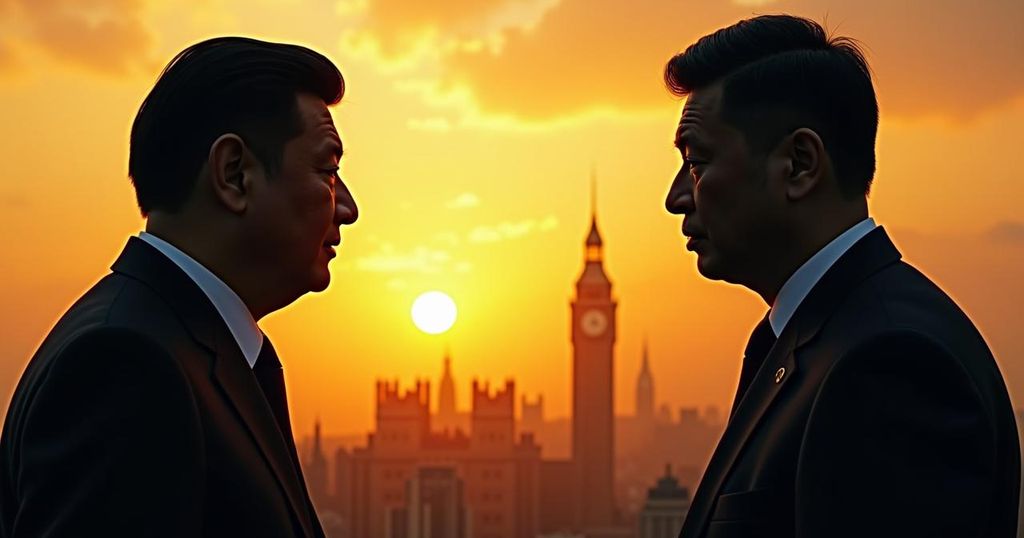China and Brazil are promoting a peace plan to resolve the Ukraine crisis, receiving pushback from Ukrainian President Zelenskyy who deems it pro-Moscow. The plan lacks reference to Ukraine’s territorial integrity and has drawn criticism from the U.S. Despite challenges, some Global South nations support the initiative, reflecting differing global perspectives on the war.
China, alongside Brazil, is spearheading an initiative aimed at garnering support from developing nations for a proposed peace plan intended to peacefully resolve the ongoing conflict in Ukraine. This effort, however, has met with resistance from Ukrainian President Volodymyr Zelenskyy. The plan, known as China’s “Six-Point Consensus,” is backed by Brazil and claims to have the endorsement of 110 nations, although it has faced notable criticism for failing to acknowledge the necessity of restoring Ukraine’s territorial integrity. Discussions held on the sidelines of the UN General Assembly, chaired by Chinese Foreign Minister Wang Yi and Brazilian advisor Celso Amorim, included representatives from 17 countries. These talks focused on preventing escalation, the avoidance of weapons of mass destruction, and the protection of nuclear facilities. Wang Yi emphasized the geographic reality that Russia and Ukraine are neighboring states, asserting that “amity is the only realistic option,” and called for increased international backing for a peace conference involving the two nations. The peace initiative has not received unanimous support; President Zelenskyy has openly criticized it, suggesting that such proposals merely afford Russia additional political leverage to prolong the conflict. Additionally, United States Secretary of State Antony Blinken has echoed similar concerns regarding China’s role, noting that Chinese entities are purportedly supporting Russia’s defense sector, thereby contributing to its aggressive posture. Nevertheless, ten countries from the Global South—including Indonesia, South Africa, and Türkiye—have expressed their endorsement of the peace plan through a joint statement. This group, identified as “friends for peace,” intends to continue its discussions in New York. Moreover, South Korea’s Foreign Minister, Cho Tae-yul, has condemned Russia for its controversial arms trade with North Korea, citing this as part of a broader pattern of transgressions that compromise peace efforts. Minister Cho has criticized Russia’s use of its veto power within the UN Security Council as a significant obstacle to actualizing resolutions to the conflict. Zelenskyy has articulated a firm stance against the China-Brazil peace plan, describing it as potentially detrimental and insisting that any legitimate negotiations require the withdrawal of Russian forces from Ukrainian territory. He has appealed to China and Brazil to utilize their influence to halt Russian aggression rather than to promote proposals regarded as insufficient for achieving genuine peace. Furthermore, China’s relationship with Russia remains robust, with recent reports indicating deepening military-technical cooperation, underscoring a strategic alliance that contradicts Beijing’s claims of neutrality in the conflict.
The article discusses the peace initiatives led by China and Brazil regarding the conflict in Ukraine, providing critical insights into international relations surrounding the war. With the ongoing conflict instigated by Russia’s invasion of Ukraine, multiple nations have taken differing stances on how to approach peace negotiations. China has maintained a delicate position, asserting it seeks a neutral role while simultaneously strengthening ties with Russia, complicating its proposed peace efforts. Concurrently, Ukrainian President Zelenskyy advocates for a peace plan rooted in international law, demanding territorial integrity and the withdrawal of Russian forces. This conflict of interest is central to the debate over the feasibility and intentions behind proposed peace plans.
In summary, China and Brazil’s peace initiative regarding the Ukraine conflict faces substantial criticism from Ukraine and the United States. Despite claims of broad support from developing nations, key concerns remain regarding the lack of emphasis on Ukraine’s territorial integrity and the implications of China’s ties to Russia. The divergence in perspectives highlights the complexity of achieving a meaningful resolution to the war, as various international stakeholders grapple with the broader geopolitical ramifications. Consequently, the struggle for a viable peace agreement continues amidst a backdrop of skepticism and geopolitical maneuvering.
Original Source: euromaidanpress.com






